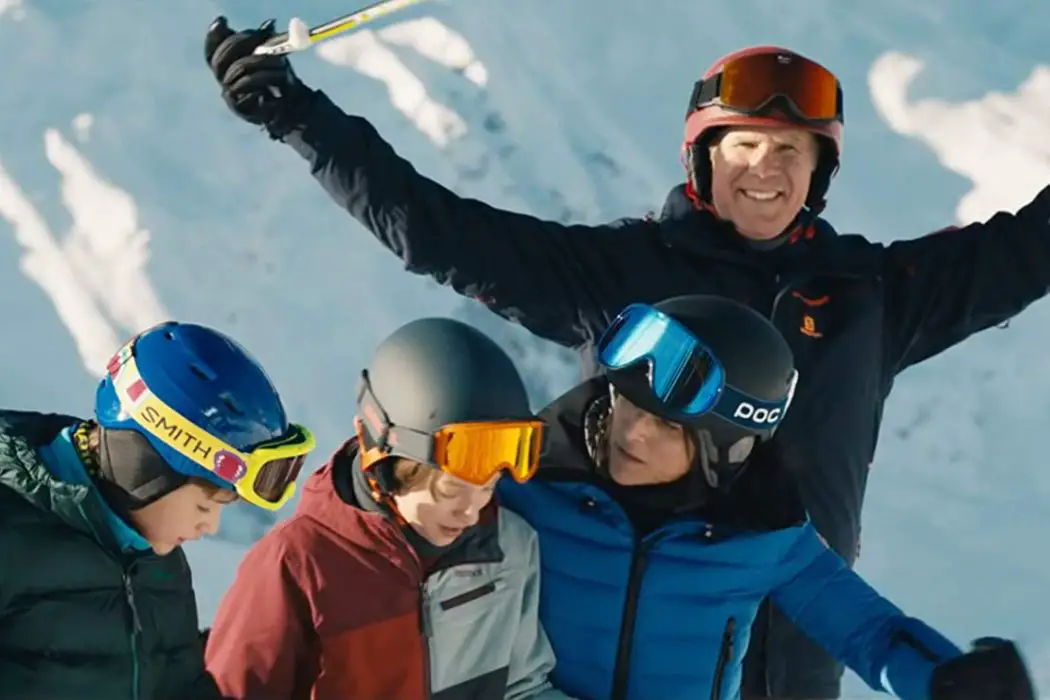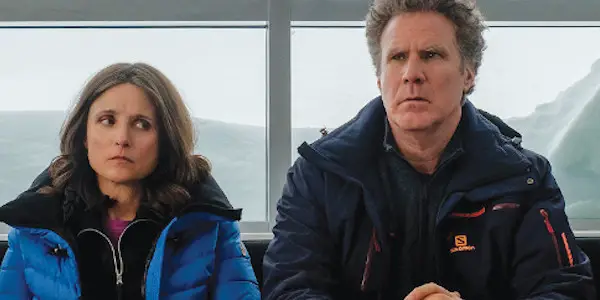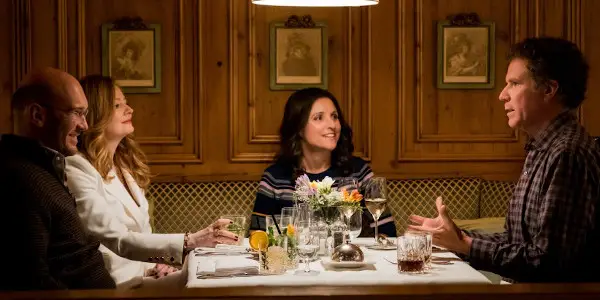DOWNHILL: Skiing Across Yellow Snow

Luke Parker is an award-winning film critic and columnist based…
From the get-go, American remakes cast somber speculation and reluctance amongst audiences, especially those who are familiar with the original and, more often than not, superior production. Now, it’s slightly unfair to impose moral tariffs on all remakes (Martin Scorsese’s The Departed for instance, an unbashful restyling of the 2002 Hong Kong picture Infernal Affairs, won the 2007 Best Picture Oscar); every film, even a remake, deserves to stand trial based on its own merits. But with a film like Downhill, a distastefully flat remake, taking that patient stance is easier said than done.
Directed by Nat Faxon and Jim Rash – who’d proven themselves capable of steering family-charged comedies back in 2013 with The Way Way Back – from a script co-written by Jesse Armstrong, the film is spearheaded by the onscreen inauguration of Will Ferrell and Julia Louis-Dreyfus, two dynamic comics whose careers have remarkably never crossed paths before. At face value, there doesn’t seem to be a distinct lack of character or talent on hand, which makes the film’s smoothed corners and backsliding comedy both incoherent and inexcusable.

The plot itself is a direct knockoff of Ruben Östlund’s 2014 dark comedy, Force Majeure, each following a family on a ski vacation who suddenly find themselves hanging together by a thread in the wake of a near-disaster. Somewhere in their translation from Swedish to English – and their exact mimicking of several shots – Faxon, Rash, and Armstrong managed to skew and scrap the richness of its predecessor and replace it with dragging drama and cringy comedy.
Icy Encounters
A pillaring beat Downhill regularly relies on are the awkward spaces wedged between its closed-in characters. The film begins with an American family, the Stantons – Billie (Louis-Dreyfus), Pete (Will Ferrell), and their two sons, Finn (Julian Grey) and Emerson (Ammon Jacob Ford) – hopping off their tour bus in front of their Austrian ski resort. As they rummage across the grounds, Billie notices that there are no other children amongst the brigade of vacationers; moments later, they’re greeted by Charlotte (Miranda Otto), a forcefully enthusiastic host who informs them that their rented domain is not typically a place for children, but rather a salle de passion, a lustful lounge atop a mountain.
In its opening minutes, Downhill has already shown its hand, establishing a generic, degrading, and frankly, nonsensical brand of comedy – one which carries lots of punchlines, but barely a smidgen of intellectual punch.
Really, who booked this trip? This film takes place in the present day, where the internet homes in on a human hand with pinpoint accuracy, and opens even the slightest of practitioners to a world of knowledge. Billie is an attorney; Pete is a higher-up at his real-estate firm, a workaholic who’s unable to take his eyes off his phone in the first place. How likely is it that neither of them would’ve researched their hotel even a little bit before landing the reservation?

The most probable explanation – and this could very possibly be the critical equivalent of throwing a bone to the screenwriters – is that Pete, an instantly and obviously distracted, disoriented father, hazily booked the room to get Billie off his back. While their cordiality fools those who meet them at the resort, and perhaps even their children, who may be more immune than ignorant to the disconnect, it’s obvious that the Stanton’s marriage is already treading rough waters.
As the film rushes forward, Rash and Facton try to make the scenes between them boom amidst the presence of several broadly drawn side characters. The group mostly consists of horny Europeans like Charlotte, but the other main contenders are Zach (Zach Woods) and Rosie (Zoe Chao), an eccentric young couple who’re also vacationing in Europe. Zach works with Pete back in the States, and acts as Pete’s centrifuge for fun away from his family. On top of the Stantons, who’re blandly written characters in their own right, this procession of familiar people makes Downhill even more dull.
The Final Straw
The pinnacle problem in Downhill is the same as Force Majeure. Taking a quick lunch break from the slopes, the family sits together on an elevated porch across from several peaks. But their picturesque background (brilliantly captured by cinematographer Danny Cohen) quickly turns dangerous when controlled explosions set off an avalanche that barrels straight towards the patio. As the snow hurls its way towards the Stantons and panic begins to stir, Pete launches from his seat, and, going back for his cell phone, sprints away from the table. Billie, meanwhile, is left clutching onto her sons for dear life.
When the dust settles, Pete casually strolls back to the table and orders soup as if nothing happened, as if he hadn’t just left his family behind. It’s a stance he continues to carry throughout the bulk of the film and one that, understandably, greatly crumbles his marriage.

It is during this time that the comedic and dramatic elements of the narrative should fuse together, and bleed into one another. One should serve the other, as Billie’s frustrations are magnified and vented, and Pete uses every mean necessary to avoid the problem at hand. And yet, one of the only magnetic impressions that’s made against the audience is not how miscast this film is, but how badly it wasted its onscreen talent.
There is a story that, if presented properly, could seamlessly allow Ferrell’s talents to flourish. Instead, in displaying Pete’s immaturity not as a moral decomposition but as a personality factor, the longtime comic appears to be playing another one of his childish man-boys. Admittedly, Louis-Dreyfus is given a bit more to do in the expressive department; but even so, not even the most convincing displays of quiet frustration and stirring impatience can override the lifeless archetype she’s been asked to inhabit.
Conclusion: Downhill
It almost makes too much sense that watching a film which explores the captive nature of marriage feels like a prison sentence. Even with such an outstanding premise, rich with the compromising positions of trauma, the finality of aging, and the expectations put upon gender, Downhill makes a conceited effort to dial up the comedic, while totally mismanaging the dramatic.
At the very least, I can say that the scenery made me miss the snow.
How do you think Downhill stands up against Force Majeure? Why do you think that American remakes of great foreign films so often fail? Be sure to drop us a comment in the section down below and share your thoughts!
Downhill is now playing in theaters nationwide.
Does content like this matter to you?
Become a Member and support film journalism. Unlock access to all of Film Inquiry`s great articles. Join a community of like-minded readers who are passionate about cinema - get access to our private members Network, give back to independent filmmakers, and more.
Luke Parker is an award-winning film critic and columnist based in the Baltimore-Washington metropolitan area. As an entertainment journalist, he has interviewed several members of the film industry and participated in some of its most prestigious events as a member of the press. Currently, he is working to obtain his bachelor’s degree in Mass Communication at Towson University.













